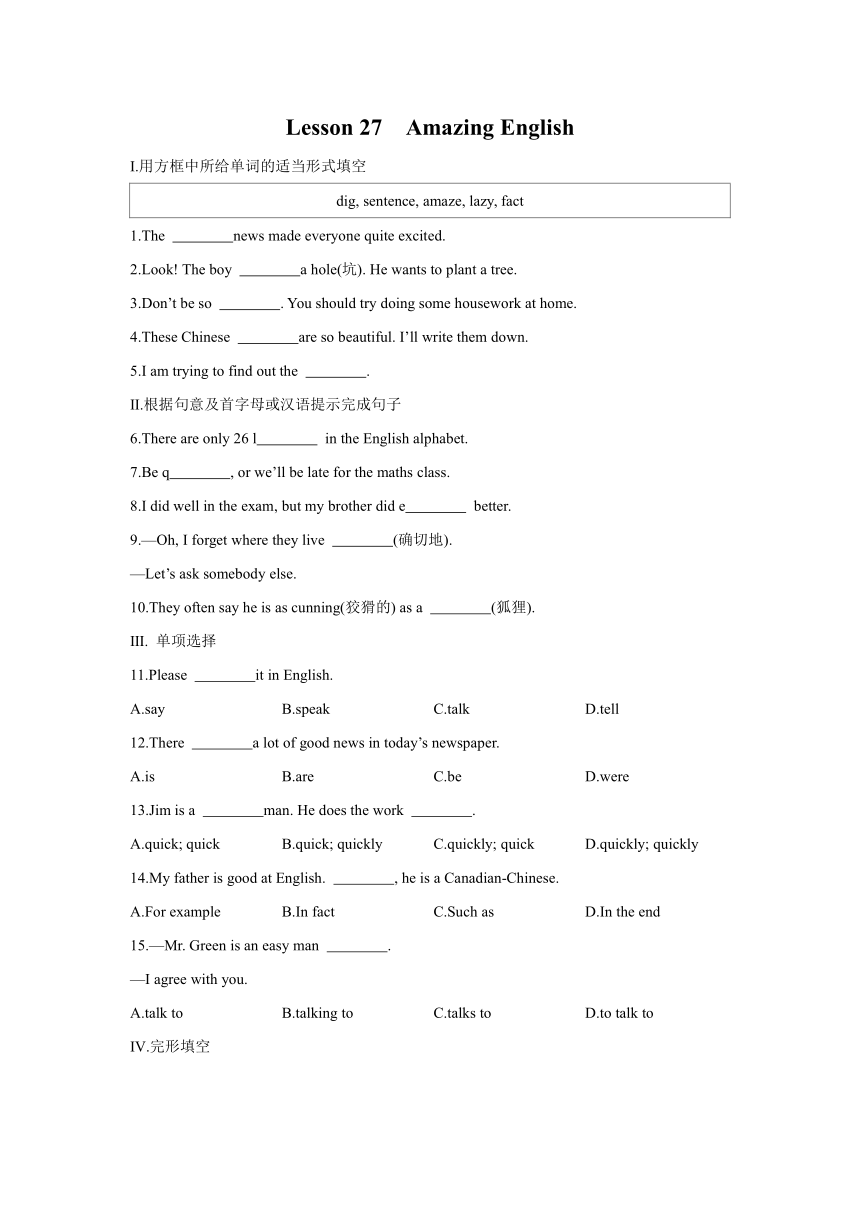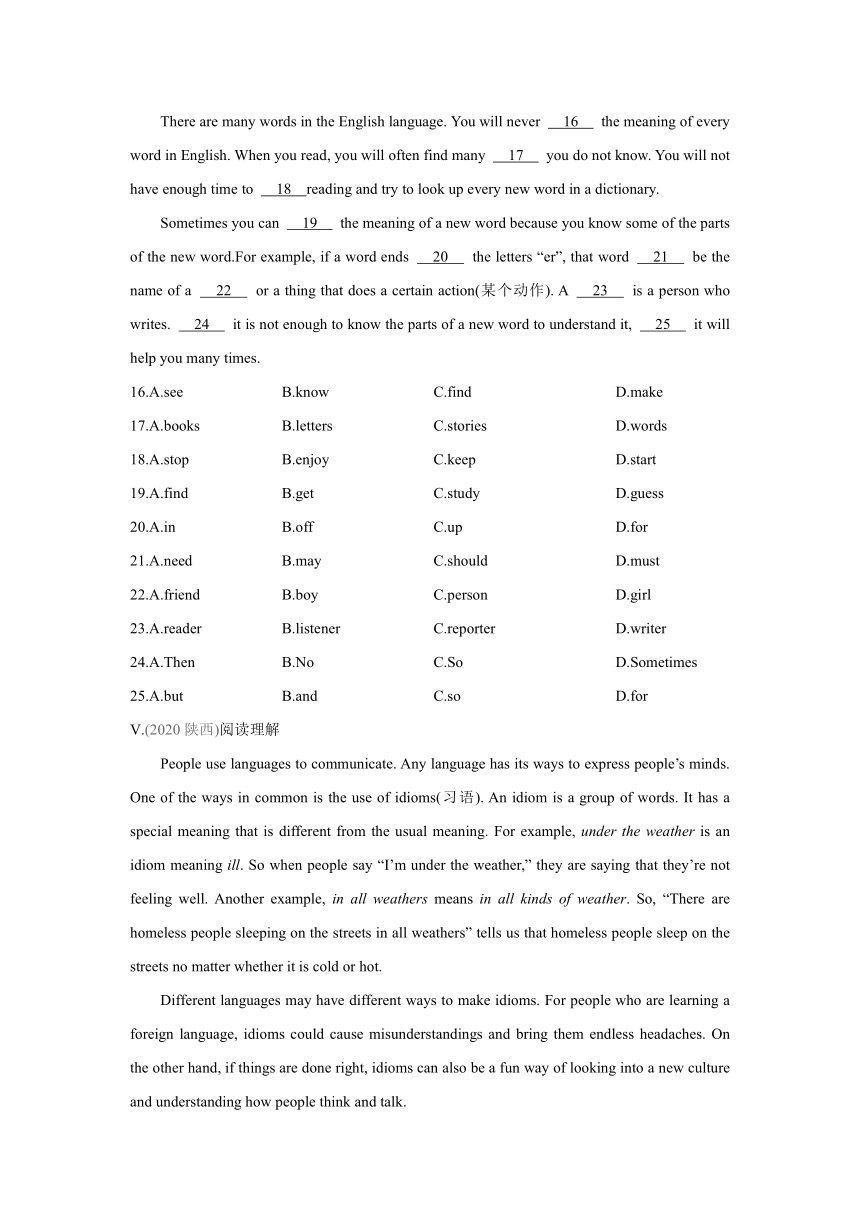Unit5 Lesson 27 Amazing English课时练习(含答案)
文档属性
| 名称 | Unit5 Lesson 27 Amazing English课时练习(含答案) |

|
|
| 格式 | docx | ||
| 文件大小 | 43.4KB | ||
| 资源类型 | 教案 | ||
| 版本资源 | 冀教版 | ||
| 科目 | 英语 | ||
| 更新时间 | 2022-04-13 00:00:00 | ||
图片预览


文档简介
Lesson 27 Amazing English
Ⅰ.用方框中所给单词的适当形式填空
dig, sentence, amaze, lazy, fact
1.The news made everyone quite excited.
2.Look! The boy a hole(坑). He wants to plant a tree.
3.Don’t be so . You should try doing some housework at home.
4.These Chinese are so beautiful. I’ll write them down.
5.I am trying to find out the .
Ⅱ.根据句意及首字母或汉语提示完成句子
6.There are only 26 l in the English alphabet.
7.Be q , or we’ll be late for the maths class.
8.I did well in the exam, but my brother did e better.
9.—Oh, I forget where they live (确切地).
—Let’s ask somebody else.
10.They often say he is as cunning(狡猾的) as a (狐狸).
Ⅲ. 单项选择
11.Please it in English.
A.say B.speak C.talk D.tell
12.There a lot of good news in today’s newspaper.
A.is B.are C.be D.were
13.Jim is a man. He does the work .
A.quick; quick B.quick; quickly C.quickly; quick D.quickly; quickly
14.My father is good at English. , he is a Canadian-Chinese.
A.For example B.In fact C.Such as D.In the end
15.—Mr. Green is an easy man .
—I agree with you.
A.talk to B.talking to C.talks to D.to talk to
Ⅳ.完形填空
There are many words in the English language. You will never 16 the meaning of every word in English. When you read, you will often find many 17 you do not know. You will not have enough time to 18 reading and try to look up every new word in a dictionary.
Sometimes you can 19 the meaning of a new word because you know some of the parts of the new word.For example, if a word ends 20 the letters “er”, that word 21 be the name of a 22 or a thing that does a certain action(某个动作). A 23 is a person who writes. 24 it is not enough to know the parts of a new word to understand it, 25 it will help you many times.
16.A.see B.know C.find D.make
17.A.books B.letters C.stories D.words
18.A.stop B.enjoy C.keep D.start
19.A.find B.get C.study D.guess
20.A.in B.off C.up D.for
21.A.need B.may C.should D.must
22.A.friend B.boy C.person D.girl
23.A.reader B.listener C.reporter D.writer
24.A.Then B.No C.So D.Sometimes
25.A.but B.and C.so D.for
Ⅴ.(2020陕西)阅读理解
People use languages to communicate. Any language has its ways to express people’s minds. One of the ways in common is the use of idioms(习语). An idiom is a group of words. It has a special meaning that is different from the usual meaning. For example, under the weather is an idiom meaning ill. So when people say “I’m under the weather,” they are saying that they’re not feeling well. Another example, in all weathers means in all kinds of weather. So, “There are homeless people sleeping on the streets in all weathers” tells us that homeless people sleep on the streets no matter whether it is cold or hot.
Different languages may have different ways to make idioms. For people who are learning a foreign language, idioms could cause misunderstandings and bring them endless headaches. On the other hand, if things are done right, idioms can also be a fun way of looking into a new culture and understanding how people think and talk.
Metaphor(比喻) is often used in idioms. Let’s read the following two examples:
● It makes my blood boil(煮沸) when people litter.
● The night was dark and quiet; my blood ran cold when I heard a strange noise outside at dark night.
In neither situation above, our blood can reach the point so high or so low in temperature. Yet, with the situations the two sentences created, it is not difficult to work out the unhappy feeling of really angry in the first example and very afraid in the second.
Of course, not all idioms are this easy to understand. When we come to idioms of a foreign language, a good dictionary of idioms is always suggested.
26.This passage tells us something about in the English language.
A.grammar B.writing C.reading D.idioms
27.If your brother breaks your computer, you can say to him, “ .”
A.I’m under the weather B.I’m there in all weathers
C.You’ve made my blood boil D.My blood runs cold
28.What is the writer’s advice when you come to an expression like under the weather
A.We should look it up in a good idiom dictionary.
B.We should try to express our minds with it.
C.We should find an interesting way to learn it.
D.We should create situations to guess its meaning.
答案
Lesson 27 Amazing English
Ⅰ.1.amazing 2.is digging 3.lazy 4.sentences 5.fact
Ⅱ.6.letters 7.quick 8.even 9.exactly 10.fox
Ⅲ.11.A 12.A 13.B
14.B in fact意为“事实上”,用来解释说明事情的真相。
15.D
Ⅳ.16—20 BDADA 21—25 BCDDA
Ⅴ.26—28 DCA
Ⅰ.用方框中所给单词的适当形式填空
dig, sentence, amaze, lazy, fact
1.The news made everyone quite excited.
2.Look! The boy a hole(坑). He wants to plant a tree.
3.Don’t be so . You should try doing some housework at home.
4.These Chinese are so beautiful. I’ll write them down.
5.I am trying to find out the .
Ⅱ.根据句意及首字母或汉语提示完成句子
6.There are only 26 l in the English alphabet.
7.Be q , or we’ll be late for the maths class.
8.I did well in the exam, but my brother did e better.
9.—Oh, I forget where they live (确切地).
—Let’s ask somebody else.
10.They often say he is as cunning(狡猾的) as a (狐狸).
Ⅲ. 单项选择
11.Please it in English.
A.say B.speak C.talk D.tell
12.There a lot of good news in today’s newspaper.
A.is B.are C.be D.were
13.Jim is a man. He does the work .
A.quick; quick B.quick; quickly C.quickly; quick D.quickly; quickly
14.My father is good at English. , he is a Canadian-Chinese.
A.For example B.In fact C.Such as D.In the end
15.—Mr. Green is an easy man .
—I agree with you.
A.talk to B.talking to C.talks to D.to talk to
Ⅳ.完形填空
There are many words in the English language. You will never 16 the meaning of every word in English. When you read, you will often find many 17 you do not know. You will not have enough time to 18 reading and try to look up every new word in a dictionary.
Sometimes you can 19 the meaning of a new word because you know some of the parts of the new word.For example, if a word ends 20 the letters “er”, that word 21 be the name of a 22 or a thing that does a certain action(某个动作). A 23 is a person who writes. 24 it is not enough to know the parts of a new word to understand it, 25 it will help you many times.
16.A.see B.know C.find D.make
17.A.books B.letters C.stories D.words
18.A.stop B.enjoy C.keep D.start
19.A.find B.get C.study D.guess
20.A.in B.off C.up D.for
21.A.need B.may C.should D.must
22.A.friend B.boy C.person D.girl
23.A.reader B.listener C.reporter D.writer
24.A.Then B.No C.So D.Sometimes
25.A.but B.and C.so D.for
Ⅴ.(2020陕西)阅读理解
People use languages to communicate. Any language has its ways to express people’s minds. One of the ways in common is the use of idioms(习语). An idiom is a group of words. It has a special meaning that is different from the usual meaning. For example, under the weather is an idiom meaning ill. So when people say “I’m under the weather,” they are saying that they’re not feeling well. Another example, in all weathers means in all kinds of weather. So, “There are homeless people sleeping on the streets in all weathers” tells us that homeless people sleep on the streets no matter whether it is cold or hot.
Different languages may have different ways to make idioms. For people who are learning a foreign language, idioms could cause misunderstandings and bring them endless headaches. On the other hand, if things are done right, idioms can also be a fun way of looking into a new culture and understanding how people think and talk.
Metaphor(比喻) is often used in idioms. Let’s read the following two examples:
● It makes my blood boil(煮沸) when people litter.
● The night was dark and quiet; my blood ran cold when I heard a strange noise outside at dark night.
In neither situation above, our blood can reach the point so high or so low in temperature. Yet, with the situations the two sentences created, it is not difficult to work out the unhappy feeling of really angry in the first example and very afraid in the second.
Of course, not all idioms are this easy to understand. When we come to idioms of a foreign language, a good dictionary of idioms is always suggested.
26.This passage tells us something about in the English language.
A.grammar B.writing C.reading D.idioms
27.If your brother breaks your computer, you can say to him, “ .”
A.I’m under the weather B.I’m there in all weathers
C.You’ve made my blood boil D.My blood runs cold
28.What is the writer’s advice when you come to an expression like under the weather
A.We should look it up in a good idiom dictionary.
B.We should try to express our minds with it.
C.We should find an interesting way to learn it.
D.We should create situations to guess its meaning.
答案
Lesson 27 Amazing English
Ⅰ.1.amazing 2.is digging 3.lazy 4.sentences 5.fact
Ⅱ.6.letters 7.quick 8.even 9.exactly 10.fox
Ⅲ.11.A 12.A 13.B
14.B in fact意为“事实上”,用来解释说明事情的真相。
15.D
Ⅳ.16—20 BDADA 21—25 BCDDA
Ⅴ.26—28 DCA
同课章节目录
- Unit 1 A Trip to the Silk Road
- Lesson 1 A Trip to China
- Lesson 2 Meet You in Beijing
- Lesson 3 A Visit to Xi'an
- Lesson 4 A Visit to Lanzhou
- Lesson 5 Another Stop along the Silk Road
- Lesson 6 Jenny's Diary
- Unit 2 It's Show Time!
- Lesson 7 What's Your Project about?
- Lesson 8 Marco Polo and the Silk Road
- Lesson 9 Danny's School Project
- Lesson 10 Music and Dance
- Lesson 11 Food in China
- Lesson 12 A Blog about the Silk Road
- Unit 3 School Life
- Lesson 13 How Is School Going?
- Lesson 14 Jenny's School Life
- Lesson 15 Making a Difference
- Lesson 16 We Are with You!
- Lesson 17 School Science Fai
- Lesson 18 Teaching in China
- Unit 4 After-School Activities
- Lesson 19 A Dinner Date
- Lesson 20 Join Our Club!
- Lesson 21 What Is Your Club Type?
- Lesson 22 Big Plans for the Weekend
- Lesson 23 A Weekend with Grandma
- Lesson 24 How was Your Weekend?
- Unit 5 I Love Learning English!
- Lesson 25 A Phone Friend
- Lesson 26 Online Phone Calls
- Lesson 27 Amazing English
- Lesson 28 How Do I Learn English?
- Lesson 29 A Door to the World
- Lesson 30 Writing an E-mail in English
- Unit 6 Seasons
- Lesson 31 What Strange Weather!
- Lesson 32 I Can't Wait for Winter!
- Lesson 33 Kim's Favourite Season
- Lesson 34 Steven's Report
- Lesson 35 Surfing in Sydney
- Lesson 36 Spring in China
- Unit 7 Sports and Good Health
- Lesson 37 You Are What You Eat!
- Lesson 38 Stay Healthy!
- Lesson 39 Danny's Report
- Lesson 40 Move Your Body
- Lesson 41 Were People Healthy Then?
- Lesson 42 Know Yourself
- Unit 8 Summer Holiday Is Coming!
- Lesson 43 Have a Good Summer!
- Lesson 44 Volunteering in Summe
- Lesson 45 Baseball Season
- Lesson 46 Get Ready for Summer Holiday!
- Lesson 47 Summer Plans
- Lesson 48 Li Ming's Summer Holiday
